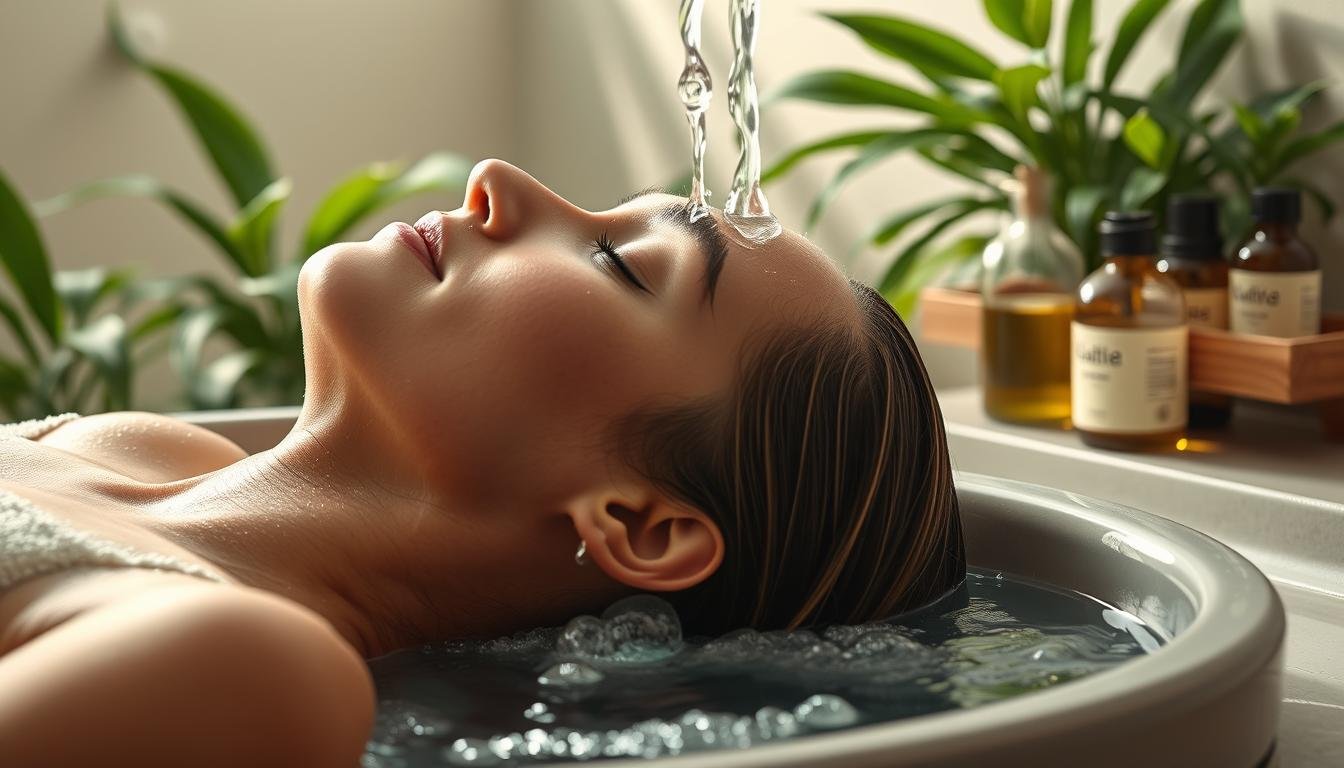What is the Best Way to Clean the Scalp? | Expert Tips
Did you know that over 50% of Americans struggle with scalp-related issues like dandruff, dryness, and itchiness? Proper scalp cleansing is essential for maintaining healthy hair and preventing these common problems. In this article, we’ll explore the Expert-approved techniques and products to keep your scalp clean, healthy, and happy.
Key Takeaways
- Proper scalp cleansing is crucial for overall hair health and preventing issues like dandruff.
- The right shampoo, massage techniques, and natural remedies can help keep your Scalp clean and nourished.
- Exfoliating the Scalp and maintaining hydration are also important for a healthy scalp environment.
- Seeking professional treatments can be beneficial for those with persistent scalp problems.
- Scalp health is closely tied to overall diet and wellness, so paying attention to your nutrition is key.
Understanding Scalp Health
Maintaining a healthy scalp is essential for promoting strong, vibrant hair growth. The scalp is home to a delicate ecosystem, known as the scalp microbiome, which plays a crucial role in overall hair follicle care. This microbiome consists of a balanced community of bacteria, fungi, and other microorganisms that work together to support a healthy scalp environment.
Importance of a Clean Scalp
A clean, well-maintained scalp is the foundation for healthy hair. When the scalp is free from excess oil, product buildup, and environmental pollutants, it can better absorb nutrients and oxygen, which are essential for hair follicle development and growth. Proper scalp cleansing also helps to regulate sebum production, prevent issues like dandruff, and maintain a balanced scalp microbiome.
Common Scalp Issues
- Excessive oiliness or dryness
- Flakiness and dandruff
- Redness, itching, and inflammation
- Sensitivity and irritation
- Product buildup and clogged hair follicles
How Scalp Cleanliness Affects Hair Growth
The health of the scalp directly impacts the health and growth of hair. A clean, well-nourished scalp promotes optimal hair follicle function, leading to stronger, thicker, and more vibrant hair. Conversely, an unhealthy scalp can contribute to issues like hair thinning, breakage, and reduced growth. Stress, environmental factors, and even diet can all influence the condition of the scalp and, in turn, the health of the hair.
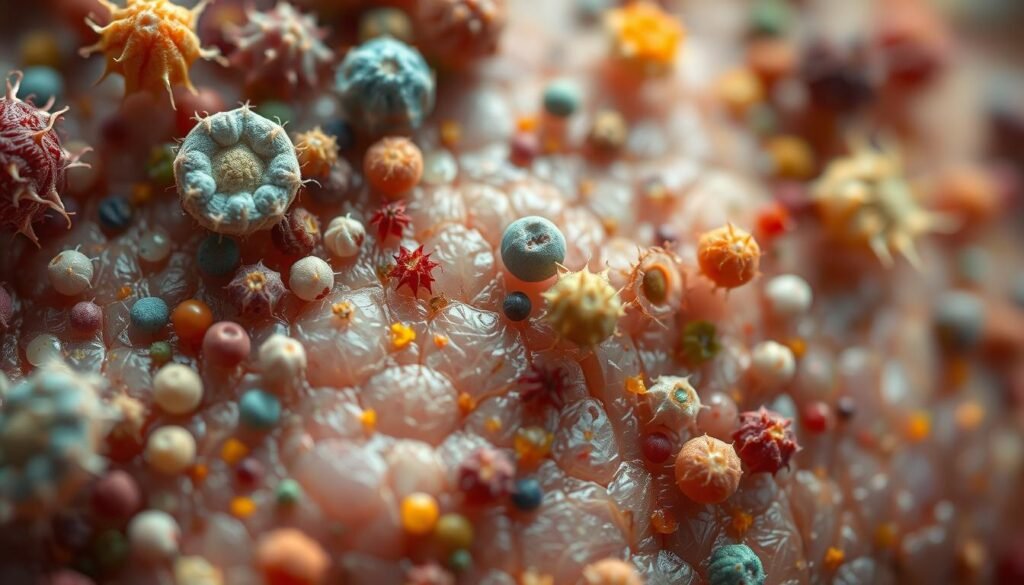
“Proper scalp care can help promote hair growth and retention according to evidence.”
Choosing the Right Shampoo for Your Scalp
Selecting the right shampoo is crucial for maintaining a healthy scalp. The type of shampoo you choose can have a significant impact on the condition and appearance of your hair. When it comes to scalp care, there are two main categories of shampoos to consider: clarifying and moisturizing.
Types of Shampoos: Clarifying vs. Moisturizing
Clarifying shampoos are designed to deeply cleanse the scalp, removing product buildup, excess oil, and impurities. These shampoos are particularly beneficial for those with oily scalps or who use a lot of styling products. On the other hand, moisturizing shampoos are formulated to hydrate the scalp, providing much-needed nourishment for dry or flaky areas.
Ingredients to Look For
- Tea tree oil: Known for its antiseptic and antifungal properties, tea tree oil can help soothe and calm an irritated scalp.
- Salicylic acid: This ingredient helps exfoliate the scalp, removing dead skin cells and unclogging pores.
- Zinc pyrithione: Effective in reducing dandruff and controlling sebum production, this compound can be found in specialized shampoos.
Avoiding Harmful Chemicals
When selecting a shampoo, it’s important to avoid harsh chemicals that can strip the scalp of its natural oils. Steer clear of sulfates, parabens, and other potentially drying agents that may cause irritation or excessive dryness.
Remember, your scalp type (oily, dry, or combination) should Guide your choice of shampoo. Consulting with a dermatologist or hair care professional can also help you find the best shampoo techniques and sulfate-free shampoo for your individual needs.
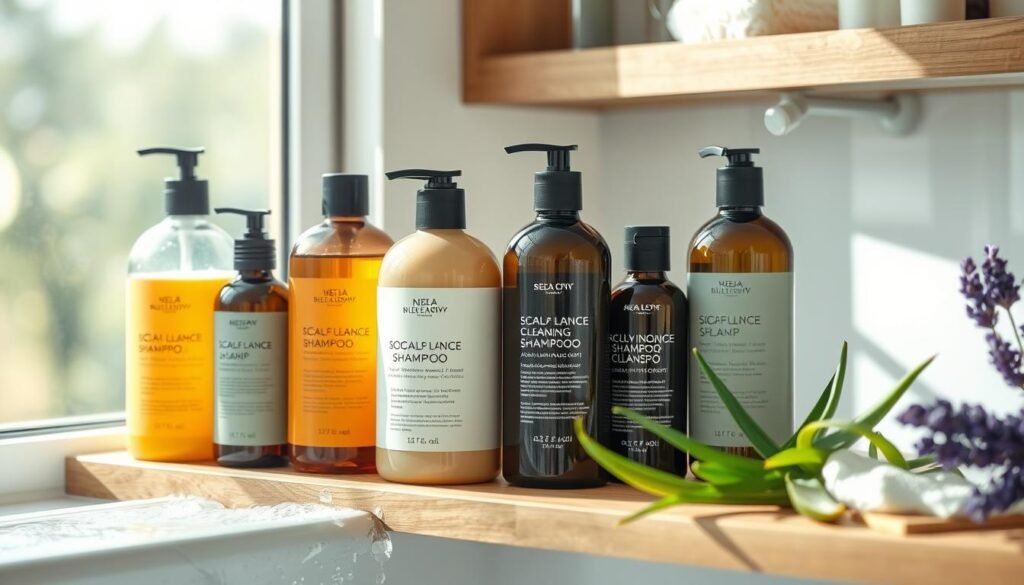
Best Techniques for Washing Your Scalp
Maintaining a healthy scalp is crucial for vibrant, strong hair growth. Proper scalp cleansing techniques involve gentle yet effective methods that stimulate blood flow and remove buildup without stripping the natural oils. By following these Expert-recommended tips, you can ensure your scalp is thoroughly cleansed for optimal hair wellness.
How to Properly Massage the Scalp
When washing your hair, take the time to massage your scalp with your fingertips. This gentle circular motion helps dislodge dirt, oil, and dead skin cells, promoting a healthy scalp environment. Avoid using your nails, as this can irritate the skin and potentially cause damage. Focus on the entire scalp, not just the visible areas, for a thorough cleansing experience.
Rinsing Techniques for Optimal Cleanliness
- Use lukewarm water, as hot water can strip the scalp of its natural oils.
- Rinse thoroughly to ensure all shampoo residue is removed, as leftover product can lead to product buildup and irritation.
- For individuals with curly hair, consider co-washing with a conditioning cleanser to maintain moisture and flexibility.
- Avoid keeping your hair wet for prolonged periods, as this can promote bacterial growth and compromise scalp health.
By incorporating these scalp massage and rinsing techniques into your hair washing routine, you can support a clean, healthy scalp that lays the foundation for strong, vibrant hair growth.
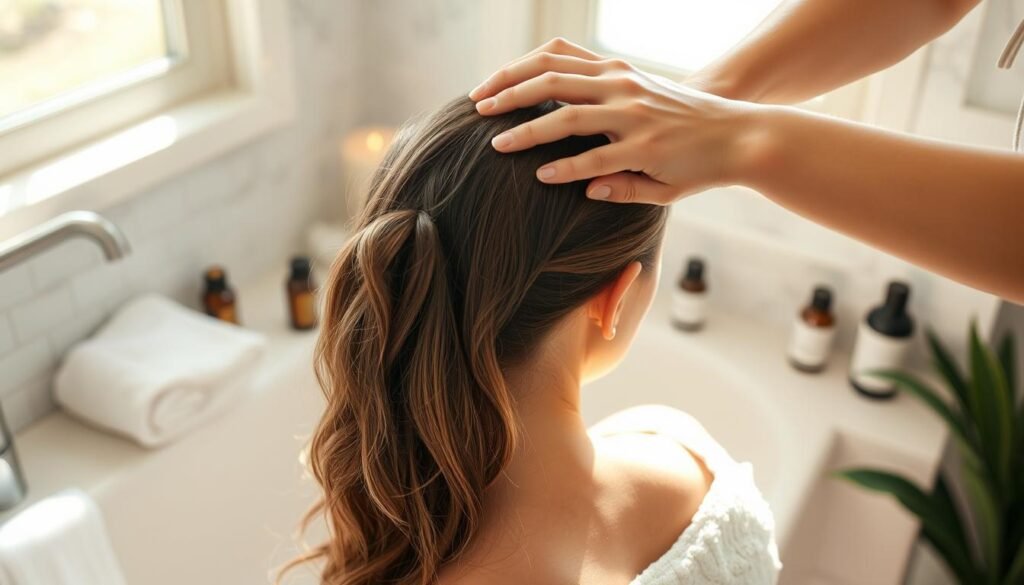
Natural Remedies for Scalp Cleaning
When it comes to maintaining a healthy, clean scalp, natural remedies can be an effective and gentle approach. These homemade scalp treatments harness the power of ingredients found in nature to nourish, soothe, and cleanse the scalp without harsh chemicals.
Benefits of Apple Cider Vinegar
Apple cider vinegar is a versatile natural scalp treatment that can help balance the pH of the scalp and remove built-up residue. Its acidic properties effectively cleanse the scalp, while also possessing anti-inflammatory and antimicrobial properties that can combat dandruff and itchiness.
Tea Tree Oil: A Natural Antiseptic
Tea tree oil is a natural antiseptic with powerful antifungal and antibacterial properties. When used as a scalp treatment, it can help alleviate symptoms of conditions like dandruff, psoriasis, and Seborrheic Dermatitis. Its soothing and cleansing effects make it a popular natural scalp treatment.
DIY Scalp Masks
Creating your own scalp masks using natural ingredients can be a nourishing and cost-effective way to pamper your scalp. Ingredients like aloe vera, honey, and yogurt can help soothe, hydrate, and gently exfoliate the scalp. However, it’s important to avoid applying oils directly to the scalp, as they can sometimes promote fungal growth.
By incorporating these natural scalp treatments into your haircare routine, you can achieve a clean, healthy scalp and promote optimal hair growth. Remember to always do a patch test first, as some natural ingredients may cause sensitivity for certain individuals.
| Natural Remedy | Benefits | Application Time |
|---|---|---|
| Bentonite clay, apple cider vinegar, and aloe vera mask | Detoxifies and deeply cleanses the scalp | 20-30 minutes |
| Oil-based scalp massage | Helps detox and nourish the scalp | 15 minutes |
| Professional hair detox treatment | Comprehensive cleansing and nourishing for the scalp | 45 minutes |
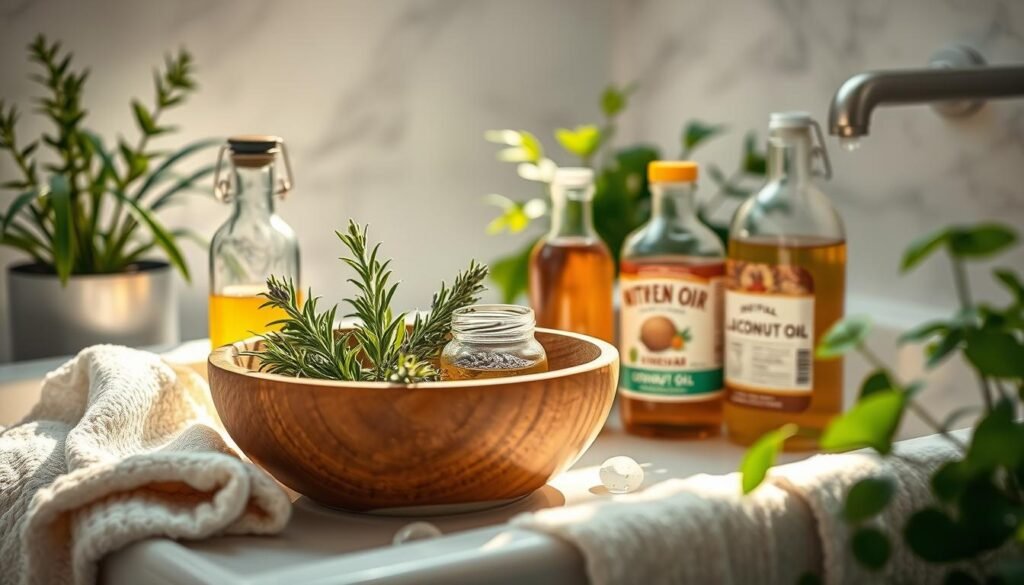
“Incorporating natural remedies into your scalp care routine can be a gentle and effective way to maintain a healthy, balanced scalp.”
Frequency of Scalp Cleaning
Maintaining a healthy scalp is crucial for strong, vibrant hair. But how often should you really be washing your hair? The answer depends on your individual scalp type and lifestyle. While there is no one-size-fits-all rule, research provides some helpful guidelines.
How Often Should You Wash Your Hair?
Studies show that a higher wash frequency, around 5-6 times per week, is both beneficial and preferred among Asian populations for overall scalp and hair satisfaction. Daily washing regimens have also proven superior to once-weekly cleansing in controlled studies.
However, individual needs vary. Those with oily scalps may require more frequent washing, while those with dry scalps may benefit from less frequent cleansing. The key is finding a balance that works for your unique hair and scalp type.
Signs That Indicate the Need for More Frequent Washing
- Visible oil or greasiness on the scalp
- Itchiness or flakiness
- Product buildup or residue
- Unpleasant odor
Over-washing can strip the scalp of its natural oils, while under-washing can lead to clogged pores and other issues. Pay attention to your scalp’s needs and adjust your hair washing frequency accordingly for healthier, happier hair.
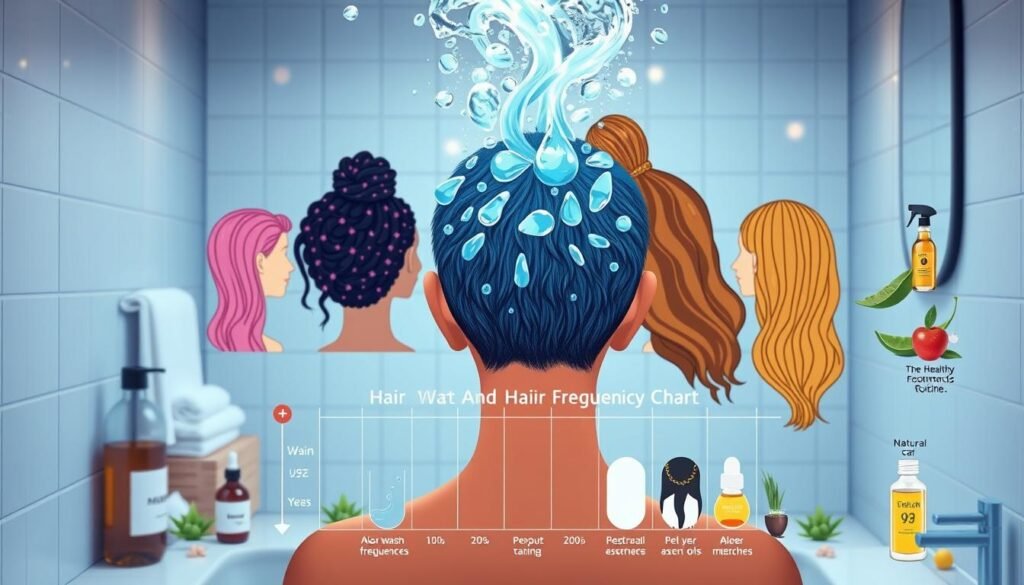
“Regular scalp cleansing is recommended at least weekly to maintain a healthy scalp.”
Exfoliating Your Scalp
Maintaining a clean and healthy scalp is crucial for promoting strong, vibrant hair growth. One effective way to achieve this is through regular scalp exfoliation. This process removes built-up dead skin cells, product residue, and excess oil, creating an optimal environment for your hair to thrive.
Why Exfoliation is Important
Scalp exfoliation offers several benefits for your hair and scalp health. It helps to unclog hair follicles, improve blood circulation, and reduce the risk of issues like dandruff, dryness, and excessive greasiness. By removing these obstructions, exfoliation can stimulate new hair growth and leave your scalp feeling refreshed and revitalized.
Types of Scalp Exfoliators
- Physical Exfoliators: These include scalp scrubs and brushes that use gentle abrasive particles or bristles to mechanically remove debris from the scalp.
- Chemical Exfoliators: Products containing ingredients like salicylic acid, alpha-hydroxy acids, or enzymes can dissolve and wash away dead skin cells and buildup.
How to Exfoliate Safely
When exfoliating your scalp, it’s important to be gentle and avoid over-scrubbing, which can lead to irritation or damage. Start by applying the exfoliator to a damp scalp and massaging it in with your fingertips using circular motions. Rinse thoroughly and follow up with a nourishing shampoo and conditioner. Limit exfoliation to once or twice a week, and consult a dermatologist if you have any pre-existing scalp conditions.
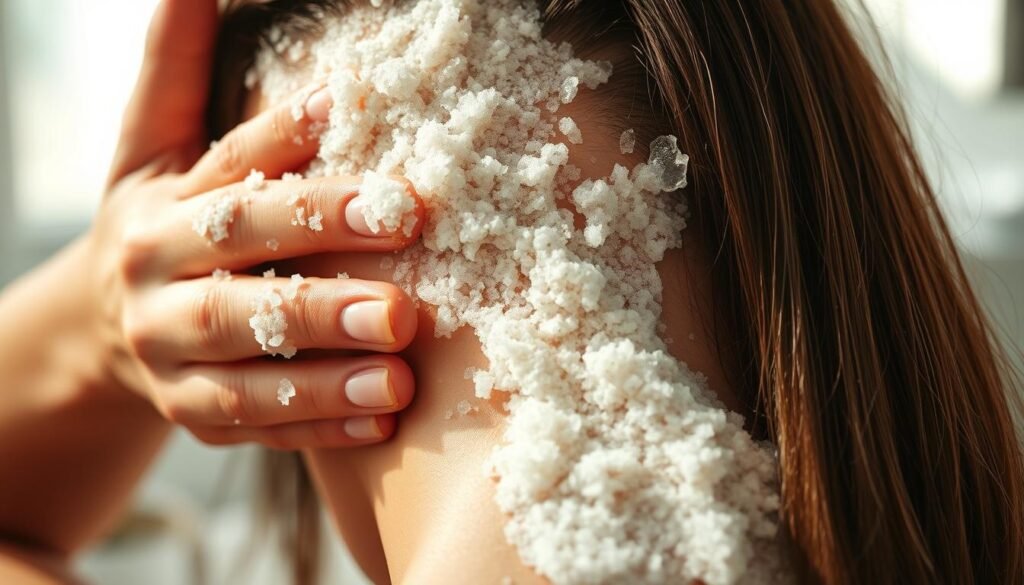
“Regular scalp exfoliation is considered key to healthier, shinier hair according to many hair experts.”
By incorporating scalp exfoliation into your haircare routine, you can effectively address buildup, improve scalp health, and create the optimal conditions for strong, vibrant hair growth. Remember to choose products tailored to your specific hair and scalp needs for the best results.
Moisturizing Your Scalp
A well-hydrated scalp is essential for maintaining healthy hair. The scalp’s microbiome, consisting of various microorganisms, plays a crucial role in creating a favorable environment for hair growth. Unfortunately, factors like cold temperatures, indoor heating, and excessive heat styling can contribute to a dry, irritated scalp, leading to flaking, itching, and poor hair health.
Understanding Scalp Hydration
Dry scalp is a common condition, particularly during colder and drier seasons like winter in the United States. Utilizing hydrating shampoos and conditioners can help replenish lost moisture and restore the scalp’s natural balance. Look for products containing humectants like glycerin or hyaluronic acid, which draw moisture into the skin.
Best Products for Scalp Moisture
- Living Proof’s Dry Scalp Treatment, which uses a vitamin B3-based microbiome balancing complex to rebalance the scalp’s natural ecosystem for long-lasting relief.
- Aloe vera-based products, as aloe vera is a natural humectant that can help retain moisture on the scalp.
- Clarifying detox shampoos with a scalp brush, used once a week, to remove buildup and dry scalp flakes, promoting healthier scalp conditions.
Additionally, massaging the scalp can help promote blood flow and stimulate the production of natural oils, aiding in scalp hydration. Incorporating the right products and techniques can make a significant difference in maintaining a well-nourished, healthy scalp.
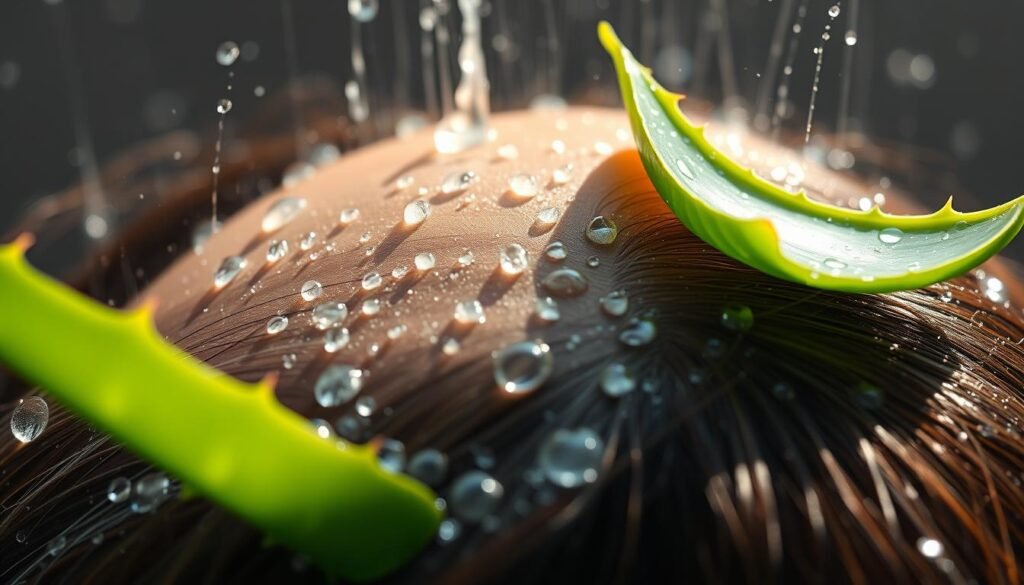
| Product | Key Ingredients | Benefits |
|---|---|---|
| Living Proof Dry Scalp Treatment | Vitamin B3-based microbiome balancing complex | Rebalances scalp’s natural ecosystem, provides long-lasting relief |
| Aloe Vera-based Products | Aloe Vera | Natural humectant that helps retain moisture on the scalp |
| Clarifying Detox Shampoo with scalp Brush | N/A | Removes buildup and dry scalp flakes, promotes healthier scalp conditions |
By understanding the importance of scalp hydration and incorporating the right products and techniques, you can maintain a well-nourished, healthy scalp that supports strong, vibrant hair.
The Role of Diet in Scalp Health
A healthy, well-nourished scalp is essential for promoting hair growth and preventing various scalp-related issues. Your diet plays a crucial role in maintaining scalp health, as it provides the necessary nutrients to support the skin and hair follicles on your head.
Foods That Promote a Healthy Scalp
- Omega-3 fatty acids: Found in fish, nuts, and seeds, these healthy fats help balance sebum production and keep the scalp moisturized.
- Vitamins A, C, and E: These antioxidants support healthy skin cell turnover and combat environmental stressors that can impact the scalp.
- Zinc and biotin: Important minerals for hair growth, these nutrients are essential for maintaining a thriving scalp and preventing hair loss.
- Protein-rich foods: Beans, meat, and dairy provide the building blocks for healthy hair and scalp tissue.
Supplements for Scalp and Hair Wellness
If your diet lacks certain key nutrients, consider taking supplements to support scalp and hair health. However, it’s always best to consult with a healthcare professional before starting any new supplement regimen. Staying hydrated by drinking adequate water is also crucial for maintaining a healthy scalp.
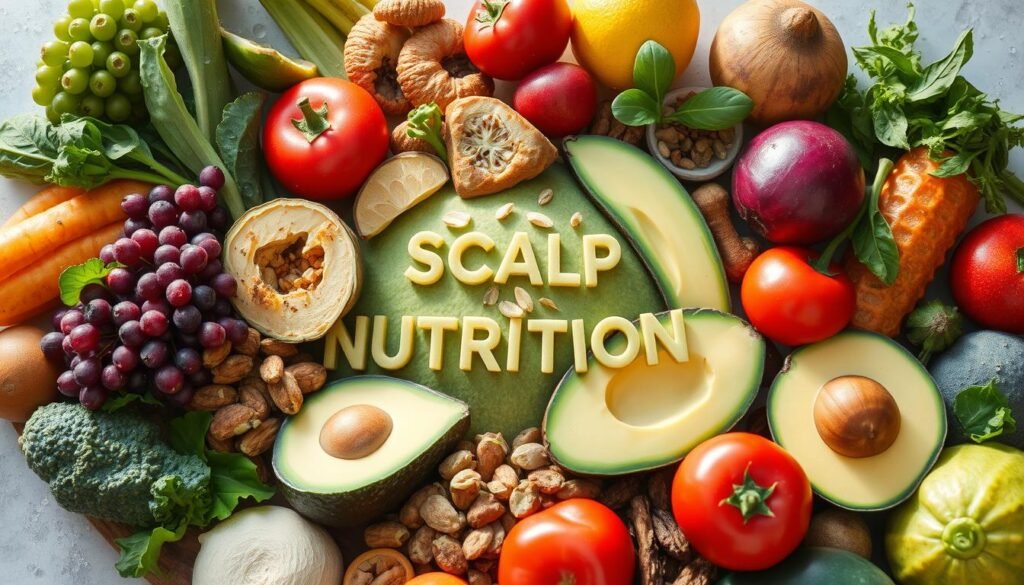
“A healthy, well-nourished scalp is the foundation for strong, vibrant hair.”
Professional Treatments for Scalp Care
While maintaining a consistent scalp cleaning routine is essential, there may be times when professional treatments are necessary to address persistent issues. If you experience severe itching, flaking, or excessive hair loss, it’s recommended to seek the expertise of a dermatologist.
When to Seek Help from a Dermatologist
Dermatologists can provide specialized care for a range of scalp conditions, including Seborrheic Dermatitis, Psoriasis, and contact Dermatitis. They can perform a thorough examination, diagnose the underlying cause, and prescribe targeted treatments to alleviate your scalp concerns.
Types of Professional Scalp Treatments
Professional scalp treatments may include medicated shampoos, scalp facials, and targeted therapies tailored to your specific needs. Some salons also offer scalp analysis and specialized treatments to address concerns like excessive oil production, dandruff, or hair thinning. Regular check-ups with a dermatologist can help maintain optimal scalp health and address issues before they become severe.
FAQ
What is the best way to clean the scalp?
The best way to clean the scalp involves using the right products and techniques tailored to your specific scalp type and needs. This includes selecting the appropriate shampoo, gently massaging the scalp, and thoroughly rinsing to remove any product buildup or excess oil.
Why is a clean scalp important for hair health?
A clean scalp is essential for overall hair health. Regular cleansing removes excess sebum, dirt, and product buildup, promoting healthy hair growth and preventing issues like Dandruff and itchiness.
What are some common scalp issues?
Common scalp issues include excessive oiliness, dryness, product buildup, flakiness, redness, and inflammation. These can all impact the scalp’s microbiome and lead to various hair and scalp problems.
How does scalp cleanliness affect hair growth?
A clean scalp promotes better nutrient absorption and healthier hair follicles, which directly impacts hair growth. Environmental factors, stress, and diet can also affect scalp health and, in turn, hair growth.
What should I look for in a shampoo for scalp health?
When selecting a shampoo, look for clarifying formulas to remove buildup and moisturizing options to hydrate the scalp. Ingredients like tea tree oil, salicylic acid, and zinc pyrithione can be beneficial for specific scalp issues. Avoid harsh chemicals like sulfates and parabens that can strip the scalp of natural oils.
How should I properly wash my scalp?
Proper scalp washing techniques involve gentle massaging with your fingertips, not nails, to stimulate blood flow and remove debris. Use lukewarm water and thoroughly rinse to remove all shampoo residue. Avoid keeping hair wet for prolonged periods to prevent bacterial growth.
What natural remedies can help clean and nourish the scalp?
Natural remedies like apple cider vinegar, tea tree oil, and DIY scalp masks using ingredients like aloe vera, honey, or yogurt can effectively clean, balance pH, and soothe the scalp. However, avoid applying heavy oils directly to the scalp, as they can promote fungal growth.
How often should I wash my scalp?
The frequency of washing depends on your individual scalp type and lifestyle. Oily scalps may require daily washing, while dry scalps benefit from less frequent cleansing. Signs that indicate the need for washing include visible oil, itchiness, and flaking. Finding the right balance is essential to avoid over-washing or under-washing.
Why is scalp exfoliation important?
Scalp exfoliation removes dead skin cells and product buildup, promoting a healthier scalp environment. Types of exfoliators include physical scrubs and chemical exfoliants like salicylic acid. Exfoliate gently to avoid irritation, and limit frequency to once or twice a week, especially if you have a sensitive scalp.
How can I keep my scalp hydrated?
Using oil-free scalp serums with humectants like glycerin or hyaluronic acid can help hydrate the scalp. Avoid applying heavy oils directly to the scalp, as this can lead to buildup. Look for products containing allantoin or panthenol for added moisture and to help alleviate dryness, flaking, and itching.
